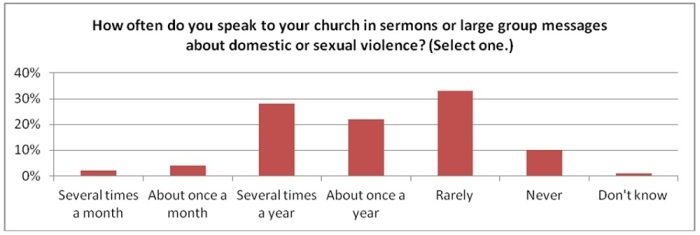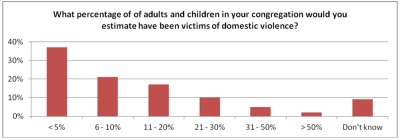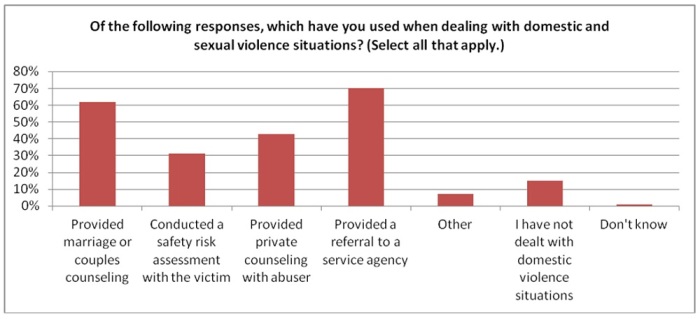The Devastating Issue Pastors Aren't Discussing
The vast majority of Protestant pastors and clergy drastically underestimate the prevalence of domestic violence and sexual abuse within their congregations, says a new report from Sojourners and IMA World Health.
Despite a 2013 World Health Organization study that showed that 35 percent of women globally have been victims of "physical and/or sexual intimate partner violence or non-partner sexual violence," and a 2011 U.S. Center for Disease Control survey with similar figures, nearly 40 percent of pastors believe that only five percent or fewer of their congregants have been victimized in the same way.

According to the study that was conducted by LifeWay Research, 17 percent of church leaders believed 11-20 percent of their congregation had suffered domestic violence or sexual abuse, while 21 percent estimated that the figure was between six and 10 percent.
Monica Taffinder, a Christian counselor who specializes in trauma recovery, depression, anxiety, and sexual abuse recovery, argues that many pastors tend to be somewhat naïve when it comes to the probability that both victims and perpetrators exist within their church.
"I really think people don't think that it happens in their congregation," Taffinder told The Christian Post. "I mean, [pastors] know these people. They see these people. They go to dinner with these people. They worship with these people. I know they're savvy enough to realize that there's just as much as they don't know people in their congregations as they do, but still."

The study also found that 65 percent of pastors had spoken one or fewer times about domestic and sexual violence, with 22 percent indicating they addressed it annually, while 33 percent mentioned it "rarely." Ten percent of pastors said they had never taught on it.
"Based on the number of times they speak to their congregations about sexual or domestic violence each year, the majority of pastors do not consider sexual or domestic violence central to larger religious themes such as strong families, a peaceful society, pursuing holiness, social justice, etc.," the report states.
The study also suggests that among pastors and church leaders who did address domestic violence, 72 percent of them did so believing that domestic violence was a problem beyond their church community, and consequently, did not discuss it as a problem within their own congregation as well. Only 25 percent of those who did address domestic violence saw it as a problem within their church.
Pastor and adjunct professor at Reformed Theological Seminary Justin Holcomb, who along with his wife Lindsey recently authored Is It My Fault?: Hope and Healing for Those Suffering Domestic Violence, suggested that one reason pastors were underexposed to conversations about domestic violence and sexual abuse was because it was "extremely shameful for a person to bring up" the subject.
"If we're talking about sexual assault, they feel 'dirty' and that they did something wrong to deserve it," Holcomb told The Christian Post. "If it's domestic violence, especially if it's a very conservative type of a place where they feel like they've failed in their role of being a homekeeper and family maintainer and failed as a godly woman to do what they're supposed to do, then that's an embarrassment. There's the sense that the 'person I choose to marry and live with is hurting me,' and so they think it looks poorly upon them."
Taffinder suggested that the vagueness associated with the term "domestic violence" could also be an obstacle to the church having more conversations on the issue.
"Historically, domestic violence has been so regulated to 'Did you hit her?'" she explained, adding that this did not encompass the broad way that it often manifested.
For instance, Taffinder recently counseled a woman, whose husband physically forced her for years to have sex with him, to the point of him ripping off her clothes and "physically manipulating her to where she couldn't move or deny him."
"It wasn't even until a few months into our therapy where she even mentioned that and 'I was like, that's rape.' She was stunned and of course he would deny that and they have been Christians their whole lives and they have been in the church their whole life," said Taffinder.
Taffinder was clear that both men and women can be victims and perpetrators of domestic violence and offered her own definition of domestic violence as "anything emotional, verbal, sexual, physical or mental that is belittling or demeaning from one spouse to the other, where the spouse on the receiving end feels trapped and the spouse who is abusing their position as the spouse, in some ways feels as though they have a right to treat the other person that way regardless of whether it is demeaning or demoralizing."
(The study listed examples of "sexual and domestic violence" to respondents as "violence, sexual assault, rape, or child sexual abuse.")

Sojourners' survey also addresses the lack of knowledge that many pastors have about resources available for victims. According to respondents, 43 percent of pastors are knowledgeable of sexual and domestic violence community resources, while 48 percent are "somewhat familiar." Eight percent have no knowledge of these resources.
The report also indicated a concern that not all resources that clergy attempted to provide would keep the victim in mind appropriately.
"The top priority in sexual and domestic violence should be to ensure the immediate safety of victims or potential victims," states the report, suggesting that this ethic at times conflicted with the values of U.S. clergy who "are strongly affiliated with values that view family matters as strictly private, place a high priority on family 'stability,' teach an absolute prohibition against divorce, practice 'male headship' and submission of women, or who see untrained 'counseling' as part of their pastoral duty."
In particular, the report shows that 62 percent of surveyed pastors who would help struggling couples with marriage counseling could "potentially lead to devastating consequences for the safety and health of the victim and others in the home."
Eighty percent pastors and clergy did indicate that they would do more to assist victims of domestic violence and sexual abuse if they had training or access to more resources.
"One of the most powerful things, anyone can do … to someone who has been abused … to actually serve people, is to tell them 'I believe you,'" said Holcomb. "The power of that is phenomenal because they go around thinking they aren't going to be believed, either because the abuse is unbelievable or because they think that they're alone. They don't know how prevalent this is also, because they're isolated, because they don't talk about it because it's shameful, they're unaware of how prevalent the suffering is."
Results from this survey are based on telephone interviews with 1,000 Protestant pastors from May 7-31, 2014. LifeWay Research's list was randomly drawn from all evangelical and Protestant churches and respondents were the senior pastor, minister, or priest. The margin of error was listed at ±3.1%.



























